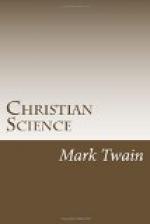“His spiritual noumenon and phenomenon silenced portraiture.” Page 34.
Yet she says she forgot everything she knew, when she discovered Christian Science. I realize that noumenon is a daisy; and I will not deny that I shall use it whenever I am in a company which I think I can embarrass with it; but, at the same time, I think it is out of place among friends in an autobiography. There, I think a person ought not to have anything up his sleeve. It undermines confidence. But my dissatisfaction with the quoted passage is not on account of noumenon; it is on account of the misuse of the word “silenced.” You cannot silence portraiture with a noumenon; if portraiture should make a noise, a way could be found to silence it, but even then it could not be done with a noumenon. Not even with a brick, some authorities think.
“It may be that the mortal life-battle still wages,” etc. Page 35.
That is clumsy. Battles do not wage, battles are waged. Mrs. Eddy has one very curious and interesting peculiarity: whenever she notices that she is chortling along without saying anything, she pulls up with a sudden “God is over us all,” or some other sounding irrelevancy, and for the moment it seems to light up the whole district; then, before you can recover from the shock, she goes flitting pleasantly and meaninglessly along again, and you hurry hopefully after her, thinking you are going to get something this time; but as soon as she has led you far enough away from her turkey lot she takes to a tree. Whenever she discovers that she is getting pretty disconnected, she couples-up with an ostentatious “But” which has nothing to do with anything that went before or is to come after, then she hitches some empties to the train-unrelated verses from the Bible, usually—and steams out of sight and leaves you wondering how she did that clever thing. For striking instances, see bottom paragraph on page 34 and the paragraph on page 35 of her Autobiography. She has a purpose—a deep and dark and artful purpose—in what she is saying in the first paragraph, and you guess what it is, but that is due to your own talent, not hers; she has made it as obscure as language could do it. The other paragraph has no meaning and no discoverable intention. It is merely one of her God-over-alls. I cannot spare room for it in this place.
“I beheld with ineffable awe our great Master’s marvelous skill in demanding neither obedience to hygienic laws nor,” etc. Page 41.
The word is loosely chosen-skill. She probably meant judgment, intuition, penetration, or wisdom.
“Naturally, my first jottings were but efforts to express in feeble diction Truth’s ultimate.” Page 42.
One understands what she means, but she should have been able to say what she meant—at any time before she discovered Christian Science and forgot everything she knew—and after it, too. If she had put “feeble” in front of “efforts” and then left out “in” and “diction,” she would have scored.




